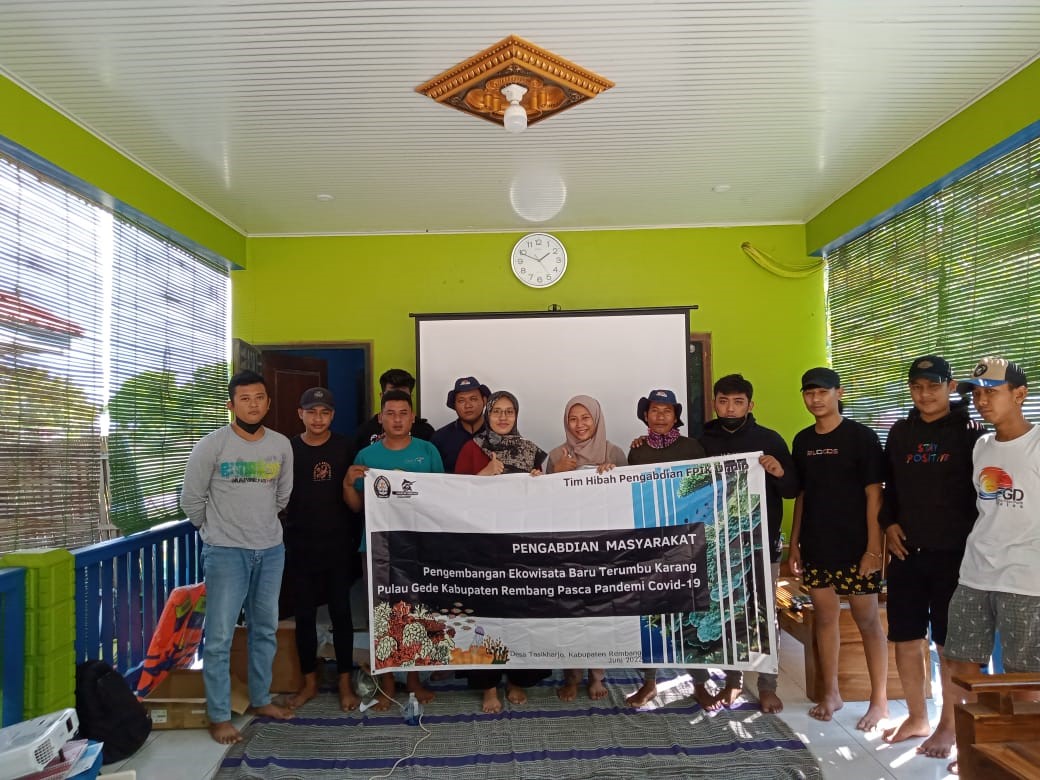The Team from the Department of Aquatic Resources, Faculty of Fisheries and Marine Sciences, Universitas Diponegoro has carried out community service activities at Pasir Putih Wates Beach, Kaliori Rembang District on June 5, 2022. This activity is also in collaboration with the Management and Pokdarwis of Wates White Sand Beach. This activity is motivated by the Covid-19 pandemic that has lasted for the last 2 years, which has reduced tourism revenue in Wates Beach, Kaliori District, Rembang Regency. The decline in revenue was due to the enactment of the PSBB, followed by PPKM for some time. Large-scale social restrictions indirectly limit the implementation of economic activities in the community. The presence of COVID-19 has changed the order of life in global and national aspects. Since early March 2020, the spread of the COVID-19 virus in Indonesia has weakened economic activity. So that during the pandemic the Wates White Sand Beach tourist spot was closed to the public. This resulted in a decrease in production and distribution activities as well as a decrease in the activity of visiting local tourist attractions in Indonesia.
Wates Hamlet, Tasikharjo Village has great potential that has not been optimized, namely small islands and coral reefs mainly located on Gede Island. Gede Island is a prima donna for tourists visiting Wates Beach. The land and sea views around the island are the main attraction for tourists. Many tourist activities do on this island such as camping, fishing, enjoying the water, or just looking at the scenery. The resources in Gede Island are abundant, such as fish, shellfish, hard corals, soft corals, anemones, Clownfish, sea rabbits, ascidians, rays, and sharks. Some of these biotas, if managed properly, are assets that can increase village income through the opening of new tourism activities, namely snorkeling tours.
The results of the dialogue with the white sand tourism manager of Wates Beach, represented by Mr. Jeffri and other managers, also supported the opening of snorkeling tourism activities after the study was completed. So far, both tourism managers and village officials feel that this activity is considered good and can attract more tourists to visit Wates Beach. Therefore, the community service team from the Department of Aquatic Resources, FPIK, Undip consisting of Dr. Diah Ayuningrum, S.Pd., M.Sc., Prof. Norma Afiati, M.Sc., Ph.D., Dr. Ir. Pujiono Wahyu Purnomo, MS and Oktavianto Eko Jati, S.Pi., M.Si. socializing efforts to develop snorkeling tourism activities at Wates Beach (Figure 1).

Figure 1. Dialogue activities with management representatives regarding efforts to open a new ecotourism snorkeling
However, several things need to be confirmed before snorkeling tours are opened. Further studies need to be done on which spots are good and safe for snorkeling activities. In addition, it is necessary to empower managers so that they know how to snorkel properly and safely so that they can become capable snorkel tour guides in the future. Besides, it is also necessary to transfer knowledge about safe and harmless biota when snorkeling. The service team from FPIK Undip also handed over TTG in the form of equipment to support snorkeling activities and safety equipment in the water. The handover was carried out symbolically to the manager of the white sand beach of Wates represented by Mr. Jeffri (Figure 2). The equipment submitted was 3 sets of snorkeling equipment (masks, snorkels, and fins) and 10 buoys.
Figure 2. Delivery of TTG in the form of sets of snorkeling equipment and buoys
The handover of the TTG is in line with the research on the suitability of snorkeling tourism on Gede Island. The output of the research is expected to be the opening of new tourism activities so that the TTG will later support managers to be able to develop snorkeling tourism in the future. The handover of the TTG was also followed by an explanation or socialization and training on how to use the equipment. The socialization was attended by 10 young people who have served on Wates Beach as tour guides (Figure 3). According to one participant, they had never received any socialization or training on the use of snorkels, so they were very excited to participate in the socialization.
Figure 3. Training on the use of snorkeling equipment to support efforts to open new ecotourism
The opening of a new tourist attraction in these waters is expected to attract tourists to visit this place. At the same time to optimally utilize the potential of natural resources such as coral reef ecosystems, reef fish, ornamental fish, seagrass beds, and fisheries there. It is hoped that this new ecotourism can be used to support economic recovery after the decline in PPKM levels due to COVID-19. Therefore, in this service, a new coral reef ecotourism object will be developed on Gede Island, Tasikharjo Village, Rembang Regency. It is hoped that in the future training in the use of snorkeling equipment sets can be carried out in stages so that these tour guides are proficient to become tour guides when snorkeling tourism activities are ready to be opened to the public.
Author : Dr. Diah Ayuningrum, S.Pd., M.Sc.
Dept. Aquatic Resources
#pengabdianmasyarakat #wates #rembang #msp #deptsda #fpik #undip #lppmundip





